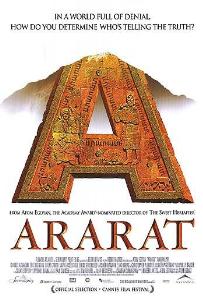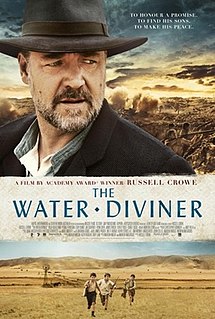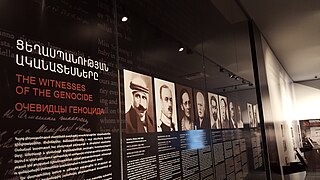
Since its independence, Armenia has maintained a policy of complementarism by trying to have positive and friendly relations with Iran, Russia, and the West, including the United States and the European Union. It has full membership status in a number of international organizations and observer status, etc. in some others. However, the dispute over the Armenian genocide of 1915 and the ongoing Nagorno-Karabakh conflict have created tense relations with two of its immediate neighbors, Azerbaijan and Turkey.

The Armenian genocide was the systematic destruction of the Armenian people and identity in the Ottoman Empire during World War I. Spearheaded by the ruling Committee of Union and Progress (CUP), it was implemented primarily through the mass murder of around one million Armenians during death marches to the Syrian Desert and the forced Islamization of Armenian women and children.

Ararat is a 2002 historical-drama film written and directed by Atom Egoyan and starring Charles Aznavour, Christopher Plummer, David Alpay, Arsinée Khanjian, Eric Bogosian, Bruce Greenwood and Elias Koteas. It is about a family and film crew in Toronto working on a film based loosely on the 1915 defense of Van during the Armenian genocide. In addition to exploring the human impact of that specific historical event, Ararat examines the nature of truth and its representation through art. The genocide is disputed by the Government of Turkey, an issue that partially inspired and is explored in the film.

A khachkar, also known as a khatchkar or Armenian cross-stone is a carved, memorial stele bearing a cross, and often with additional motifs such as rosettes, interlaces, and botanical motifs. Khachkars are characteristic of medieval Christian Armenian art.

Alma Johansson (1880–1974) was a Swedish missionary who worked in the city of Mush in the Ottoman Empire at the beginning of the 20th century.

Armenian genocide denial is the claim that the Ottoman Empire and its ruling party, the Committee of Union and Progress (CUP), did not commit genocide against its Armenian citizens during World War I—a crime documented in a large body of evidence and affirmed by the vast majority of scholars. The perpetrators denied the genocide as they carried it out, claiming Armenians were resettled for military reasons, not exterminated. In the genocide's aftermath, incriminating documents were systematically destroyed, and denial has been the policy of every government of the Republic of Turkey, as of 2022.

Armenian genocide recognition is the formal acceptance that the systematic massacres and forced deportation of Armenians committed by the Ottoman Empire from 1915 to 1923, during and after the First World War, constituted genocide. Most historians outside of Turkey recognize that the Ottoman persecution of Armenians was a genocide. However, despite the recognition of the genocidal character of the massacre of Armenians in scholarship as well as in civil society, some governments have been reticent to officially acknowledge the killings as genocide because of political concerns about their relations with the Republic of Turkey. As of 2022, governments and parliaments of 33 countries—including the United States, Germany, France, Italy, Canada, Russia and Brazil—have formally recognized the Armenian genocide.

Bodil Katharine Biørn, also known as Mother Katharine, was a Norwegian missionary.

Current and historical relations exist between Armenia and Denmark. Armenia has an embassy in Copenhagen, and Denmark is represented in Armenia, through its embassy in Kyiv, Ukraine. Diplomatic relations were established on 14 January 1992. The current Armenian Ambassador to Denmark is Hrachya Aghajanyan. In 2008, the Armenian Foreign Minister Eduard Nalbandyan called the relations between Armenia and Denmark "friendly" and "highly appreciating". In 2013 Amstream was founded as an independent non-political and non-profit organization in order to initiate means of collaboration and partnerships between Armenia and Scandinavia within business, education and culture.

Karen Jeppe was a Danish missionary and social worker, known for her work with Ottoman Armenian refugees and survivors of the Armenian genocide, mainly widows and orphans, from 1903 until her death in Syria in 1935. She was a member of Johannes Lepsius' Deutsche Orient-Mission and assumed responsibility for the Armenian children in the Millet Khan German Refugee Orphanage after the 1895 Urfa massacres.

Anna Hedvig Büll was a Baltic German missionary from Estonia, who helped to save the lives of several thousand Armenian orphans during the Armenian genocide.
Armenian genocide in culture includes the ways in which people have represented the Armenian genocide of 1915 in art, literature, music, and films. Furthermore, there are dozens of Armenian genocide memorials around the world. According to historian Margaret Lavinia Anderson, the Armenian genocide had reached an "iconic status" as "the apex of horrors conceivable" prior to World War II.

The Water Diviner is a 2014 drama film starring and directed by Russell Crowe, in his directorial debut, and written by Andrew Anastasios and Andrew Knight. The film is loosely based on the book of the same name written by Andrew Anastasios and Dr. Meaghan Wilson-Anastasios. It follows an Australian farmer, Joshua Connor (Crowe), who travels to Turkey soon after World War I to find his three sons who never returned.

Maria Jacobsen was a Danish missionary and a key witness to the Armenian genocide. Jacobsen wrote the Diaries of a Danish Missionary: Harpoot, 1907–1919, which according to Armenian genocide scholar Ara Sarafian, is "documentation of the utmost significance" for research of the Armenian genocide. Jacobsen is known as "Mayrik" or "Mama" for her humanitarian efforts and having saved many Armenians during the genocide.

Witnesses and testimony provide an important and valuable insight into the events which occurred both during and after the Armenian genocide. The Armenian genocide was prepared and carried out by the Ottoman government in 1915 as well as in the following years. As a result of the genocide, as many as 1.5 million Armenians who were living in their ancestral homeland were deported and murdered.

The 100th anniversary of the Armenian genocide was commemorated on April 24, 2015. April 24, 1915 is considered the beginning of the Armenian genocide, and is commonly known as Red Sunday, which saw the deportation and execution of many Armenian intellectuals.
The following lists events that happened during 2014 in Armenia.

1915 is a 2015 American psychological thriller film written and directed by Garin Hovannisian and Alec Mouhibian. The film stars Simon Abkarian, Angela Sarafyan, Nikolai Kinski, Debra Christofferson, Jim Piddock, and Samuel Page. It follows a mysterious director staging a play to bring the ghosts of a forgotten tragedy back to life on the 100th anniversary of the Armenian genocide.

The Promise is a 2016 American epic historical war drama film directed by Terry George, from a screenplay he co-wrote with Robin Swicord. Set in the final years of the Ottoman Empire, the film stars Oscar Isaac, Charlotte Le Bon and Christian Bale. The plot is about a love triangle that develops between Mikael (Isaac), an Armenian medical student, Chris (Bale), an American journalist, and Ana, an Armenian-born woman raised in France, immediately before and during the Armenian genocide.
Vote brigading is massively coordinated online voting. It refers to the practice of affecting reviews or scores on websites that feature crowdvoting, such as online stores or review websites, by calling on large numbers of people to submit reviews, thus boosting or decreasing ratings artificially. This may be done for political reasons, for example, to harm the commercial prospects and credibility of films dealing with controversial or sensitive subjects. Vote brigading is a form of participation bias, which can decrease the reliability of the aggregated score.

















